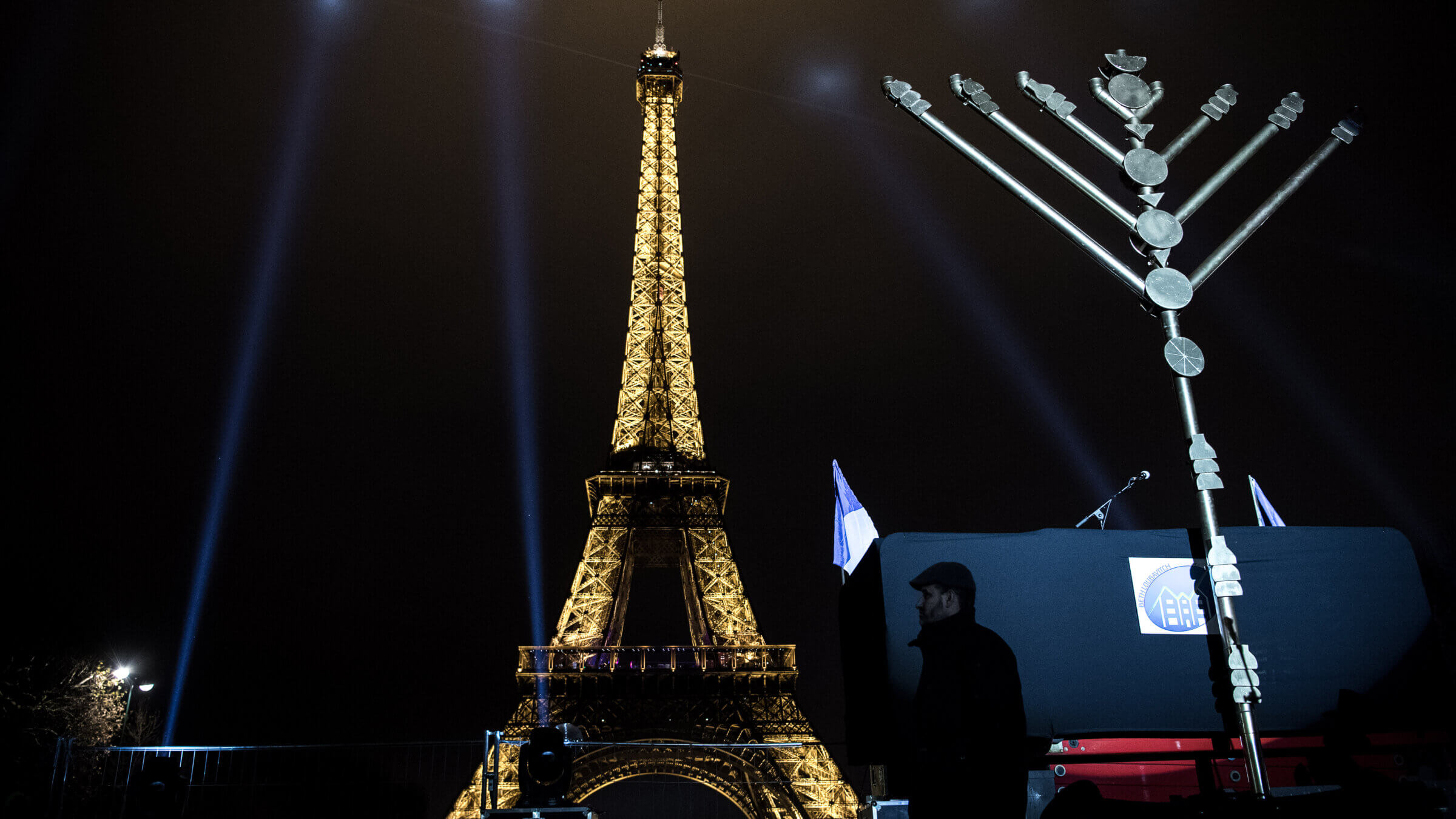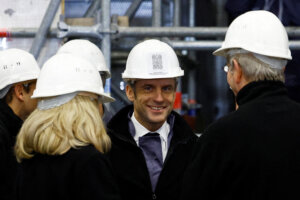How a Hanukkah faux-pas in France ignited a political firestorm
Lighting a menorah at the presidential palace, President Emmanuel Macron is accused of blurring the line between church and state

A menorah is lit near the Eiffel Tower in Paris. Photo by Getty Images
One always needs to be careful when lighting a candle, even a Hanukkah candle, when flammable material is nearby. This is a simple lesson that French president Emmanuel Macron has only just learned — not just to his own dismay but also that of many other French people.
The scene of the figurative bonfire was, remarkably, the official home of the president, the Elysée Palace. It was in the presidential gold-leafed reception hall that, on Thursday night, Macron was awarded the Lord Jacobovits Prize, an award established in 2011 by the European Conference of Rabbis to honor individuals who have distinguished themselves in the combat against antisemitism and the defense of the freedom to practice the Jewish faith.
Thursday also happened to be the first night of Hanukkah. With a mind to “faire d’une pierre deux coups,” or kill two birds with one stone, Haim Korsia, the chief rabbi of France, decided to mark the holiday. While Macron, hands clasped in front, stood to one side, Korsia lit both the shamash and first candle while intoning the blessings. Macron also lit a candle, though not for festival of light but instead for the memory of the millions who died in the Shoah.
The promise of the shehecheyanu, however, was quickly transformed into something more pessimistic. All it took was a tweet when, later that evening, Mendel Samama, one of the rabbis who attended the ceremony, released a video of the lighting, which he hailed as “Historique!”
Historic, indeed. For the first time since 1905 and the promulgation of the law separating the French state and church — one that affirmed the strict neutrality of the former in religions affairs and relegated the latter to the private sphere — a religious ceremony was held inside the presidential palace. As a result, what was kept alive on that first night was not the miracle of the Jewish holiday, but the meaning of French laicity. The event was, as one commentator declared, “without precedent.”
Almost immediately, the festival of lights was overtaken by critics lighting into Macron for desecrating the secular purity of the French republic. On the political left, Manuel Bompard, the spokesperson for La France insoumise (Defiant France) lambasted Macron for this “inexcusable political mistake,” while a colleague, Aléxis Corbière, declared that republican presidents should never engage in such activities: “This is why earlier presidents did not do what Macron did. Will he do this for other faiths? For some, but not for others? This is a dangerous spiral.”

While the relationship between Defiant France and French Jewry has been vexed since the Hamas massacre of Israelis more than two months ago, this has not been the case for other left-wing parties like the Socialists. Yet they too were astonished by the event at the Elysée. Michaël Delafosse, the Socialist mayor of Montpellier, affirmed that the Elysée, like his own city hall, “must never be the site of such celebrations,” while the Socialist senator Laurence Rossignol compared Macron to a “a 10-year-old child whose toy chemistry set has been replaced with real nitroglycerine and matches.”
These criticisms were echoed by yet other Socialists. The leader of the group of Socialist senators, Patrick Kanner, confessed his shock over the event. “Emmanuel Macron considers that the most elementary rules of republican concord do not apply to him. Laicity is indivisible.” In a different vein, the Socialist deputy Jérôme Guedj wondered who “would ever dream of a president attending the blessing of a nativity scene or a prayer led by an imam?”
The reaction of political figures like Kanner and Guedj is especially telling because they are both Jewish. Obviously, so too is the prominent rabbi Gabriel Farhi, who tweeted his outrage, describing the event as “historically scandalous.” Most telling, though, was the response of Yonathan Arfi, the president of the Representative Council of French Jewish Institutions (Crif). The Elysée “is not the place to light Hanukkah candles,” Arfi remarked, reminding the president that “the DNA of republicanism is to keep one’s distance from everything that is religious.”
While these same criticisms were voiced by politicians on the traditional right, there was a different, and more disturbing, response from the extreme right. Apart from a brief response from its spokesperson, the Rassemblement national remained silent, as did its leader Marine Le Pen. For a party whose DNA includes racism, authoritarianism and Holocaust denialism, the silence was perhaps inevitable. If anything, the party’s silence was even more telling given its strenuous efforts to portray itself as the surest guarantee — le bouclier, or shield — for French Jewry against the rise of antisemitism. This effort is the newest wrinkle in the party’s quest to gain republican respectability and even attract Jewish support — a task made all the easier by the continued refusal by the leader of Defiant France, Jean-Luc Mélenchon, to condemn Hamas as a terrorist organization.
In a sly aside, the RN spokesperson, Laurent Jacobelli, suggested that Macron had held the ceremony to compensate for his failure to join the massive march against antisemitism in Paris a few weeks earlier. Yet Jacobelli was not alone to advance this as the reason for Macron’s decision to host the Hanukkah celebration. Several commentators across the political spectrum agreed that the French president had committed a serious political mistake by deciding to remain, like his model Charles de Gaulle, “au-dessus de la mêlée” or above the brouhaha of everyday politics.
But Macron’s decision to remain above it all instead pulled him more deeply into the wind sheers of French politics. Paradoxically, his absence from the march was underscored not just by the presence of leaders from every other political party, including Marine Le Pen and her second-in-command Jordan Bardella, who a few days earlier had insisted in a jaw-dropping interview that the party’s founder, Jean-Marie Le Pen, was not an antisemite. Macron’s absence was also emphasized by the predictable absence of Mélenchon, who insisted that the march amounted to little more than support for Israel’s demolition of Gaza.
Two days after the event, Macron visited the cathedral of Notre Dame, which he had vowed, shortly after the 2019 fire that had consumed the roof and collapsed the spire, would reopen before the end of 2024. When asked by reporters about the controversy over the Hanukkah celebration, the helmeted Macron shrugged it off, asserting that it conformed to the values of republican concord and laicity. “The Republic is not the effacement of religions,” he insisted, “but instead it’s the liberty to believe or not believe.”
Perhaps. But the real problem is whether, in an increasingly polarized and anxious country, Macron’s fellow citizens agree with him.






















